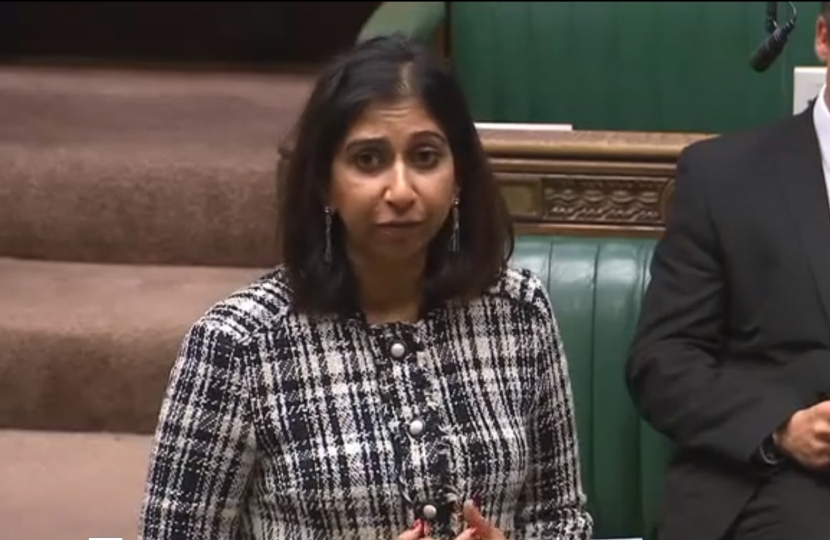
Brexit Update – 01.03.19
I am disappointed that the Prime Minister has delayed the next meaningful vote on the draft Withdrawal Agreement, which may now not be held until the 12th March. This is very close to our withdrawal date of the 29th March and will make ratification of the deal very challenging, especially as the Withdrawal Agreement must be enshrined into domestic legislation and passed by both houses of Parliament.
I resigned as a Brexit Minister in November because I could not support the draft Withdrawal Agreement, predominantly because of the Northern Ireland Backstop which, if implemented, would see the UK enter an indefinite customs union without the unilateral ability to leave it. This is not Brexit, and that is why I resigned and then voted against the deal in mid-January. I also voted against the deal because it would commit the UK to paying £39bn without any guarantees on what the Future Relationship would entail and because of continued oversight of our legal system by the European Court of Justice for some years to come.
Soon after the deal was rejected by MPs, the Prime Minister came before the House of Commons to update MPs on how she would proceed in trying to renegotiate the Northern Ireland Backstop. When the motion to accept this statement was put before a vote in the Commons, I voted in support of the Graham Brady amendment which stated that the draft Withdrawal Agreement could be accepted as long as the Backstop was replaced with “alternative arrangements”. This amendment was passed by a majority of MPs and the Prime Minister went back to Brussels with a mandate to renegotiate the Backstop.
It was also in late January that the ‘Malthouse Compromise’ was put forward by Housing Minister and pro-Brexit MP Kit Malthouse. Plan A of the proposal is to replace the Backstop with a free trade agreement to ensure that goods can cross the Ireland-Northern Ireland border without customs checks. Failing this, Plan B proposes a no-deal transition whereby the UK would leave the EU without a deal, but would enter a transition period until December 2021 where import tariffs would be kept at zero while an advanced free trade agreement is negotiated as permitted under WTO rules. This would also involve a membership fee of around £10bn p.a, which is approximately what we pay now to the EU. Although this plan is not ideal, it does propose a better solution for Northern Ireland and a better way forward for a no-deal scenario. Many colleagues and I back this plan and want the Prime Minister to adopt it as official policy.
The Prime Minister was supposed to bring the draft Withdrawal Agreement back before MPs again on the week beginning the 25th February, but she has delayed this until some point before the 13th March. Addressing the House of Commons on the 25th February, not only did the Prime Minister confirm this delay, but also that if the deal cannot be passed by the 12th March, then two further votes will take place: Firstly on whether the UK should leave without a deal, and secondly, whether Article 50 should be extended. If MPs vote against leaving with no-deal, then they will vote on extending Article 50. Although these votes will not be legally binding, it is convention that the Government follows the will of the House of Commons. If MPs reject no-deal and approve an extension of Article 50, then the Prime Minister will ask for an extension until probably July.
I do not want to see an extension of Article 50. Brexit must be delivered on the 29th March as mandated by both houses of Parliament when they passed the legislation to trigger Article 50. Having a concrete exit day also puts pressure on both sides to reach an agreement. If we entertain the notion of extending Article 50, then this just kicks the can down the road and gives the EU greater leverage at the negotiating table. I do not want the UK to leave with no-deal, but if the option is no-deal or no-Brexit, then we must go for no-deal under the Malthouse Compromise which would ensure that we leave the EU on the 29th March as promised, but with a transition period to avoid disruption on both sides of the English Channel whilst ensuring that a free trade agreement can be secured.
On the question of a second referendum which is often raised with me, I remain opposed to this as it would only draw out the Brexit process, create more uncertainty and threaten to overturn the biggest democratic mandate that the UK has ever had in the shape of the 2016 referendum - the result of which was ratified in the 2017 General Election where over 80% of voters voted for parties which backed Brexit. It's vital that we deliver Brexit as voted for in both the referendum and the general election.
My fear now is that there is a growing majority in Parliament to extend Article 50 to facilitate a soft Brexit. There are many MPs in Parliament who still refuse to accept the result of the referendum and many others who accept the result but want to stay in the EU through the back door. Clubbed together, this could see a majority of MPs trying to take control of the business of the House of Commons and passing the Yvette Copper Bill to extend Article 50 for a long time, during which, the UK would end up accepting a soft Brexit where we stay in the Single Market and the Customs Union, or Norway Plus as it has been dubbed by commentators.
This is not Brexit and that’s why colleagues and I have held our noses and said that we will accept the Withdrawal Agreement on the condition that the Backstop is removed, as well as pushing for the Malthouse Compromise which delivers Brexit on the 29th March by proposing a solution to the Backstop and a no-deal transition period.

